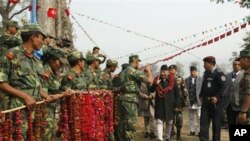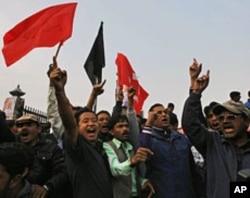Nepal has taken a major step forward in drawing its decade-long civil conflict to a formal close. The country's leading political parties have reached an agreement on integrating former Maoist combatants into the country's military.
The deal, announced in Kathmandu late Tuesday night, allows 6,500 former Maoist insurgents to occupy posts in Nepal's newly structured military.
The remaining approximately 12,000 former insurgents will receive about $11,000 to restart their lives.
The deal is seen as a crucial step in overcoming a key hurdle in Nepal's drawn-out peace process following the signing of a deal in 2006 to end hostilities. The Maoist rebels who ended the country's monarchy became one of the main political forces wrangling over a new constitution and political system.
George Varughese is the Asia Foundation's representative for Nepal in Kathmandu. He says Tuesday's agreement is, if not historic, at least transformative for the peace process.
"This represents a departure of the Maoist mainstream from its hard line. It represents a further maturation of the Maoist party, and certainly displays the flexibility of the other parties," said Varughese.
The deal has already been condemned as "humiliating" by one of Nepal's more radical Maoist factions, which had demanded better terms for the integration of former rebels.
However, it is supported by the four parties that constitute an 85 percent majority of Nepal's political factions.
The next step in the peace process is for Nepal's constituent assembly to draft a constitution, a process it has failed to complete despite previous deadlines.
Varughese says he expects the process to continue past yet another deadline, which is set to expire later this month.
"This surely means that we're looking at an extension of the constituent assembly for another six months. This prime minister, in all likelihood, will continue to oversee the process," he said.
The U.S. State Department praised Nepal's "landmark" deal soon after it was announced, and called on all parties to continue working for Nepal's "democratic, stable, and prosperous" future.







